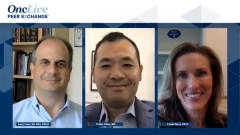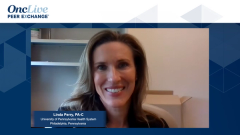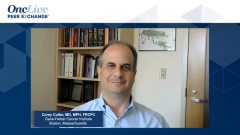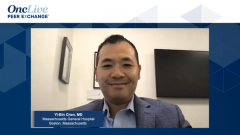
Using Multidisciplinary Care to Optimize Outcomes in GVHD
Sharing closing thoughts on acute and chronic GVHD management, expert panelists first consider the value of multidisciplinary care.
Episodes in this series

Transcript:
Corey Cutler, MD, MPH, FRCPC: It takes a village, obviously, to treat both acute and chronic graft-vs-host disease [GVHD]. Linda, do you want to tell us any pearls you might have on employing this multidisciplinary team to treat acute and chronic GVHD?
Linda Perry, PA-C: Sure. And I do think the multidisciplinary approach tends to apply a little bit more with chronic GVHD. Mainly because of the variety of manifestations that are seen. As the transplant team, of course, we’re the primary team involved that is driving everything, but we can’t do it all by ourselves, that’s for sure. We do routinely incorporate our pulmonary team for virtually all patients with lung GVHD so they have a pulmonologist available and waiting, should they run into issues as well. We’ll get our oral medicine folks involved, that’s what they’re trained to do, and even though we might be aware of the vast majority of topical, oral, medications there will always be some pearls that are of use. And, of course, our ophthalmologists are critical.
There are so many different disciplines that can be involved, but even within just the transplant team itself, it does take a lot to manage somebody, especially with chronic GVHD, from the physician to ATP [Advanced Transplant Providers], triage nursing is handling the huge amount of phone calls and messages from these patients with a constant barrage of questions, and the pharmacy, with the logistics of getting a lot of the specialty medicine. This is not something that just 2 or 3 people on a team can handle by themselves, so it really is critical. Dermatologists, of course, are hugely involved with acute and chronic GVHD patients. It really does take a village, as you said.
Corey Cutler, MD, MPH, FRCPC: Yi-Bin, other elements to the team, social workers and psychosocial providers. How do you incorporate them into your management?
Yi-Bin Chen, MD: Probably not as optimally as we should, admittedly. I think certainly we have social workers devoted to our transplant team for all facets of transplant care starting from the beginning, prior to transplant, and then afterward. And certainly, patients who develop acute or chronic GVHD due to the aforementioned issues on quality of life, probably the inability to return to work, and subsequent issues that occur, do probably benefit from the help of our social workers more than those who are able to return to full performance status. I agree with everything that’s been said; I think, especially for chronic GVHD, we’re just recognizing all the issues. They’re always there, it’s just that now we have an increasing number of survivors, we have more options with agents.
I think patients are doing better, as you mentioned, and so we have the ability to study and better address all of the issues for our patients. I think our colleagues in nutrition, physical therapy, and so forth certainly benefit our patients tremendously as well. And that leaves out the entire benefit that caregivers for our patients can have also. I think that, being a very understudied aspect of cancer care in general, has recently started to be studied as well. Addressing the needs of our caregivers certainly is something that we need to look for in the future.
Corey Cutler, MD, MPH, FRCPC: This was a tremendously rich, informative, broad-based discussion. Before we wrap up, final thoughts, Linda? Exciting things or why you’re excited about the field?
Linda Perry, PA-C: I think just in general, as you had alluded to earlier, one of the key hopes for both acute and chronic GVHD is better prophylaxis to prevent this from occurring in the first place. But until then, I think especially for chronic GVHD, just in general as providers, as patients, as caregivers, I think we all need to do a really solid job of reporting symptoms, identifying them, screening appropriately as able, just to make sure we do capture signs of GVHD, especially chronic GVHD, early on.
We know that chronic GVHD to a certain extent can be reversible if it’s treated aggressively and caught early on, so that is the key. We hope that these patients are cured of their underlying illness. The last thing we want to do is give them another illness that could lead to a significant morbidity and mortality event, too.
Corey Cutler, MD, MPH, FRCPC: Yi-Bin, final thoughts?
Yi-Bin Chen, MD: Yeah, some of what I mentioned before, I’m just super impressed with the amount of investigation that’s ongoing in our field. I’ve been doing this for about 15 years, and when I started, the number of clinical trials or investigations were nothing compared with what’s going on now. And that’s partly due to advocacy, that’s partly due to the approvals and the success that our colleagues and that we have experienced.
Patients definitely are having improved outcomes, but by no means should we rest on our laurels. There’s a lot of work to be done. And the resources, the collaboration, that’s what makes this fun, and really trying to make progress for our patients and improve outcomes. I’ll have to say, I’m optimistic for the next decade knowing what’s going on right now.
Corey Cutler, MD, MPH, FRCPC: I agree with you entirely, Yi-Bin. We’ve got 4 drugs approved in the last 4 to 5 years. I think there are more coming down the pike for sure. We didn’t talk about some of the other exciting ones that will probably get across the FDA finish line. I think patients are doing better. There is real momentum in the field to keep moving things forward, and I think we’re going to see a lot more of that in the next few years.
With that, I want to thank both Linda and Yi-Bin for participating today in this discussion. Thank you to our viewing audience. We hope that you found this OncLive® Peer Exchange®discussion to be useful and informative and hope you all have a great rest of your day.
Transcript edited for clarity.










































